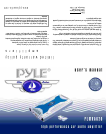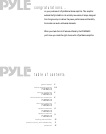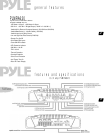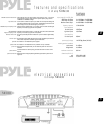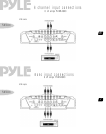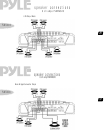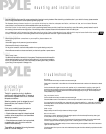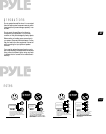
11
mounting
mounting and installation
10
Your new Pyle Marine Series amplifier comes complete with all required mounting hardware. When determining a suitable location in your vehicle for the amp, please remember
that it is a high-power electronic device capable of generating high heat.
For this reason, always choose a location in your vehicle which has low vibration, adequate ventilation, a minimum of dust, and no moisture. Be sure to
mount the amp in such a manner as to allow reasonable airflow over the cooling fins.
Mark the location for the mounting screw holes by positioning the amp where you wish to install it and use a scribe (or one of the mounting screws) inserted in each of
the mounting holes to mark the mounting surface. If the mounting surface is carpeted, measure the hole centers and mark with a felt tip pen.
Before attempting to drill the mounting holes, take note of any wires, lines or other devices in your vehicle which may be located behind the mounting
surface! Then drill pilot holes in the mounting surface for the mounting screws and insert them. Tighten the screws securely.
The built-in protection circuitry in the
Marine
amplifiers will disable the amplifier if it senses an
input overload, a speaker short circuit, or extreme
temperature conditions.
When the protection circuit is activated by any of
these conditions, the Protection LED will be
illuminated.
If this occurs, carefully inspect the system to
determine the source of the problem.
• If the shutdown was a result of a thermal overload
condition, allow the amplifier to cool down before
attempting to restart it.
• If the shutdown was a result of an input overload,
or speaker short circuit, be sure to correct the
condition before restarting.
The amplifier can be restarted by turning the remote
power OFF and then ON again.
protection
circuitry
troubleshooting
No output.
Confirm that all terminal strip connections are secure and tight.
Check both in-line and built-in fuses. Both the +12V and the Remote terminals must have +12v referenced to chassis
ground.
Confirm that the audio signal source (car radio, equalizer, etc.) is connected and is supplying output signal. To
check if the amp is supplying signal, unplug the cables from the signal source (but leave them plugged into the
amp). Briefly tap the center pin of each of the disconnected RCA plugs with your finger. This should produce a
noise (feedback) in your speakers.
Only one channel works.
Confirm that all terminal strip connections are secure and tight.
Check the Balance control on the head unit (or other source) to verify that it is set to its midpoint.
If you are using the Low Level RCA input, reverse the input plugs at the amplifier (i.e., switch the L with the R). If
the channels which is silent switches to the other side, the problem is either in the head unit/other source or the
connecting cables.
Weak output.
Readjust the Input Level Control(s) to better suit the input signal.
Noise in the audio.
If the noise is a “whine” whose pitch follows the engine speed, confirm that the amplifier and any other signal
sources (head unit, etc.) are properly grounded.
If the noise is a “clicking” or “popping” noise whose rate follows the engine speed, this usually means that the
vehicle is equipped with resistor spark plugs and wires, or that the ignition is in need of service.
Check the rounting of the speaker and input wires to make sure they are not adjacent to wires which interconnect
lights and other accessories.
If the above steps fail to improve or clear noise interference, the system should be checked by a professional mobile
audio installer.
fuses
wiring tips
When making electrical connections to your amplifier, please observe the
following:
Use at least 8 gauge wire for power and ground connections.
Wire the amplifier directly to the car battery.
For the ground connection, use the shortest possible wire to a good chassis ground point.
Wire the Remote connection to the auto start lead of your head unit, equalizer or power antenna.
About power fuses:
Pyle Marine Series amplifiers feature built-in fuse systems. These fuses protect both the amplifier
and the electrical system in your vehicle from fault conditions. If you ever need to replace the
fuse in your Pyle Marine Series amp, use a fuse of exactly the same type and rating. A different
type or rating of fuse may result in damage or fire.



